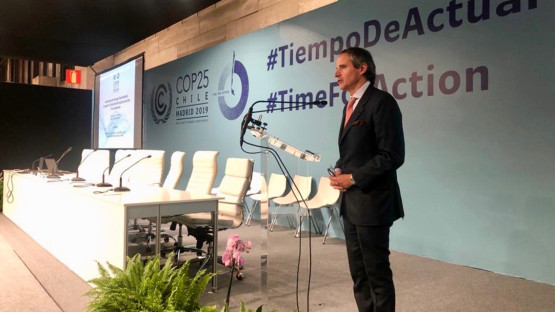(As prepared for delivery)
I am very pleased to be with you here today at this important COP 25 side event.
This is my first trip since I took up office as Director General of the International Atomic Energy Agency last week.
This reflects the importance of the issue and my firm belief that nuclear science and technology have an important role to play in helping the world to address the climate emergency. That view is shared by many of the IAEA’s 171 Member States.
Today, around two-thirds of the world’s electricity comes from burning fossil fuels. By 2050, if climate change goals are to be met, 80% or more of our electricity will need to be low-carbon.
Making that transition will be a huge challenge.
Nuclear power now provides about 10% of the world’s electricity. But it contributes one third of all low-carbon electricity.
Nuclear power plants produce virtually no greenhouse gas emissions or air pollutants during their operation. Emissions over their entire life cycle are very low.
Renewables such as wind and solar power are growing in importance. But these are intermittent energy sources which cannot meet countries’ needs on their own. That means more use of nuclear power will be needed.
Nuclear power offers a steady, reliable supply of electricity. It can provide continuous, low-carbon power to back up increasing use of renewables. It can be the key that unlocks their potential by providing flexible support—day or night, rain or shine.
We should not see nuclear energy and renewables as being in competition with one another. In order to achieve climate change goals and ensure sufficient energy for the future, we need to make use of all available sources of clean energy.
Nuclear power is already reducing carbon dioxide emissions by about two gigatonnes per year. That is the equivalent of taking more than 400 million cars off the road – every year.
Thirty countries are using nuclear power today. If any major users were to stop using nuclear power overnight, this would have very serious consequences for CO2 emissions.
It is not a coincidence that some countries with nuclear power have already largely decarbonized their electricity production – France and Sweden, for example.
Contrary to many perceptions, use of nuclear power continues to grow. Over the last five years, 37 nuclear power reactors have been connected to the grid. Fifty-three more are under construction.
Four countries have started building, or are nearing completion of, their first nuclear power plants. Around 25 others are actively considering adding nuclear power to their energy mix.
In the coming years, technological advances and new funding models are likely to improve the economic attractiveness, safety and cost-effectiveness of nuclear power.
For example, small modular reactors could make nuclear power feasible on smaller grids, and in remote settings, and for non-electrical applications.
Ladies and Gentlemen,
Let me say a few words about the role of the IAEA.
The IAEA Statute authorises us to work on the “development and practical application of atomic energy for peaceful purposes, including the production of electric power.”
The Agency contributes directly to the achievement of nine of the 17 Sustainable Development Goals, and indirectly to several more.
As the centre for global cooperation in the nuclear field, we help countries to use nuclear power safely and securely. We establish global nuclear safety standards and security guidance.
We provide extensive practical assistance with everything from energy planning, site selection, legal and regulatory matters, waste disposal and end-of-life plant decommissioning. Expert IAEA peer review missions help countries to assess the safety of their facilities.
In October, we held the first International Conference on Climate Change and the Role of Nuclear Power, which attracted more than 500 participants from 79 countries, with significant participation from other UN agencies.
A key function of the IAEA is to implement safeguards in 183 countries, verifying that nuclear material is not diverted from peaceful activities. When assisting new countries in introducing nuclear power, we stress that they must have a cast-iron commitment to non-proliferation.
Ladies and Gentlemen,
Climate change is already causing significant damage to coastal and urban infrastructure in a number of countries.
It threatens the livelihoods of farmers and entire communities, compromising food security and access to water, threatening harvests and enabling the spread of insect pests and disease.
The IAEA makes available applications of nuclear science to help address these challenges.
For example, our scientists help countries to develop new varieties of rice and barley that are tolerant of drought, extreme temperatures and salinity. These conditions are being exacerbated by climate change.
We support the use of nuclear techniques to identify and manage limited water resources.
Our specialist laboratories in Monaco and near Vienna help countries to obtain reliable environmental data and devise accurate models to help predict future conditions.
We have run international studies to help understanding of the effects of climate change on polar and mountainous regions. We support the analysis of scientific climate data in a way that is meaningful for policy-makers.
In conclusion, Ladies and Gentlemen, let me reaffirm my conviction that nuclear power should be a key part of the global energy transformation.
It will be very difficult, if not impossible, to achieve sustainable development and meet global climate goals without significant use of nuclear energy.
The IAEA is committed to assisting our Member States in making optimal use of nuclear science and technology in order to improve the well-being and prosperity of their people.
Thank you.


